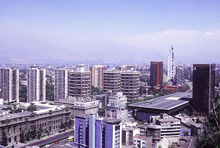
Typical street scene in Santa Ana, El Salvador. (Photo: iStock)
IMF Survey: SWF Principles Will Help Cross-Border Investment—Lipsky
September 3, 2008
- Sovereign wealth fund (SWF) working group in preliminary agreement
- Draft voluntary principles and practices will improve understanding of SWFs
- SWFs play beneficial role in global financial system, says Lipsky
The proposed voluntary principles and practices for sovereign wealth funds, along with an OECD investment code on behalf of recipient countries, will help create a global environment that enables more effective cross-border investing, according to John Lipsky, IMF First Deputy Managing Director.

Santiago, Chile, where preliminary agreement was reached on Santiago Principles to guide sovereign wealth funds (photo: Newscom)
SANTIAGO PRINCIPLES
Lipsky was speaking in Santiago, Chile on September 3 at a seminar organized by Chile's Ministry of Finance. In a meeting on September 1-2, representatives of 26 sovereign wealth funds said they had reached a preliminary agreement on a draft set of Generally Accepted Principles and Practices (GAPP), also known as the Santiago Principles. The GAPP is a voluntary framework to guide the conduct of appropriate investment practices, as well as governance and accountability arrangements, of sovereign wealth funds.
"The GAPP seeks to help maintain the free flow of cross-border investment and sustain open and stable financial systems," Lipsky said. "By embracing the GAPP's principles and practices, SWFs could reduce concerns and thereby help to mitigate the risk of protectionist pressures on their investments and restrictions on international capital flows," he added.
Positive role in global financial system
Highlighting the increasing importance of SWFs not only in their own countries but also in the international financial system, Lipsky said that such funds today account for between one-fourth and one-third of all foreign assets held by sovereigns. "SWF assets are projected to surpass the stock of foreign exchange reserves in the not-so-distant future and to top $7-$11 trillion by 2013," he said.
Praising the "shock-absorbing role" that the SWFs had played by providing capital during the past year's financial turmoil in advanced-economy markets, Lipsky said it reflected the funds' typically long-term investment horizons, limited liquidity needs, and mainly unleveraged positions. Also, the funds clearly understand "their long-term interest in preserving well-functioning, open, liquid markets," he noted.
However, recipient countries have raised concerns about the potential noncommercial motives of SWF investments. Such negative perceptions could be damaging to all parties as well as diminish the stability of the global financial and monetary system by undermining the efficient flow of global capital, he said.
In this context, both SWF sponsor and recipient countries would benefit from the "enhanced clarity" provided by the voluntary principles and practices. The GAPP would improve the understanding of SWFs and allow the newly established funds to benefit from the experience of others, he pointed out.
Next steps for GAPP
Speaking on September 2 at the conclusion of the Santiago meeting, the co-chair of the International Working Group of Sovereign Wealth Funds (IWG), Hamad al Suwaidi, said the next step is for each IWG member to recommend the GAPP to their respective governments in the coming weeks. The IWG then expects to present the GAPP to the International Monetary and Financial Committee, the IMF's key policy-guiding body, when it convenes on October 11 in Washington. The GAPP is expected to be published after that meeting.
The IWG members are also exploring the establishment of a standing group of sovereign wealth funds. This recognizes the need to carry forward the work relating to GAPP, as necessary, and to facilitate dialogue with official institutions and recipient countries on developments that affect SWF operations.
IMF as facilitator
The Working Group was co-chaired by Jaime Caruana, the Director of the IMF's Monetary and Capital Markets Department, with the IMF acting as the group's secretariat.
David Murray, Chairman of the Future Fund Board of Guardians—the Australian SWF—lauded the role of IMF as facilitator and coordinator of the work of IWG. "The IMF with its 185 members is the only institutional body in the world that has sufficient understanding of the macroeconomic policies and central bank arrangements of those countries and precedence in some of the work they've done that could help us understand ways of approaching the GAPP."
He emphasized that the "GAPP remains a voluntary document of sovereign wealth funds," but noted that "the IMF is easily the best institution to help guide this work."
Comments on this article should be sent to imfsurvey@imf.org


